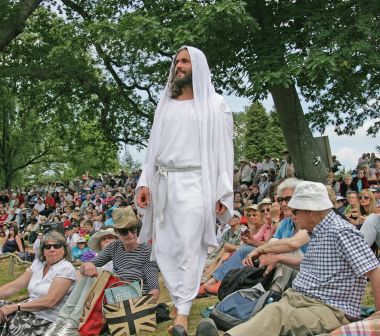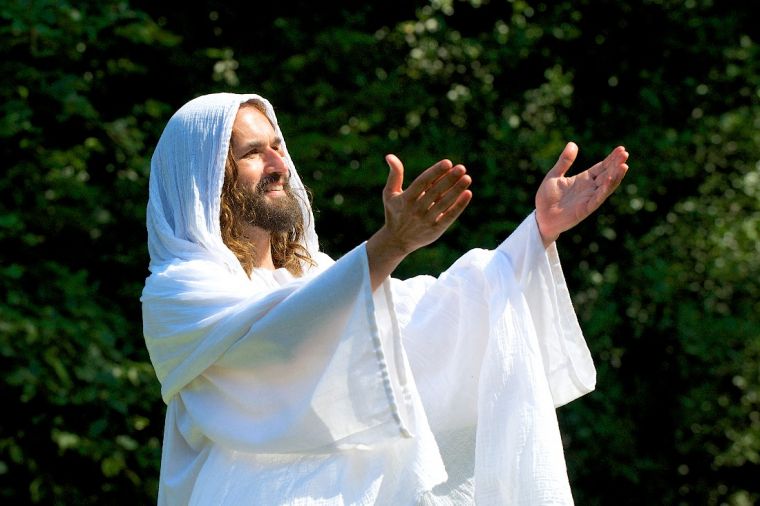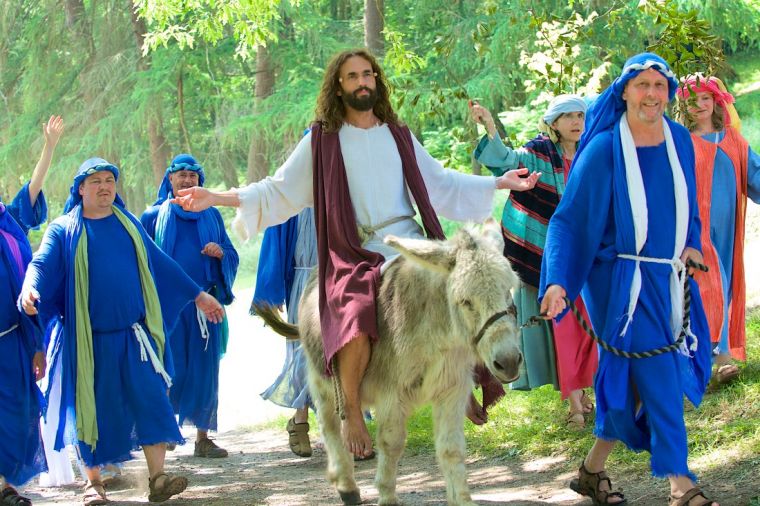Playing Jesus

Each year, tens of thousands of people turn out to watch the Wintershall Estate's Easter Passion play in London's Trafalgar Square, and its open-air summer production, Life of Christ, in its beautiful Surrey grounds.
Portraying Jesus is one of the most challenging roles an actor can take on but it's what James Burke-Dunsmore has done for nearly a quarter of a century.
Now, he is preparing to play Jesus for the last time in this summer's run of Life of Christ at the Wintershall Estate from 21 to 25 June.
James speaks to Christian Today about the demands and rewards of the role - and why he returned to it year after year.
CT: The play was halted during the pandemic. How hard was that for you and the other cast and crew?
James: Just the day before we went into lockdown, the producer and I were in Trafalgar Square promoting our Easter production so it was right down to the wire and very late on in our rehearsals. That was hard because a lot of the actors have been producing these plays for as long as I have, around 25 years, and it's a pilgrimage of sorts because there is the Easter production and then the summer production and Christmas plays.
It's not just a play but a big part of our lives and our calendar - because performing in these plays means that you are busy over Easter and Christmas, they become a part of your own celebration. So, for many, it felt like the actual celebration of Easter and Christmas had been taken away. By the second year, we were missing each other so much because for two decades we had been such a big part of each other's lives.
CT: How has it felt to be able to resume the productions this year?
James: It was a wonderful feeling to be back in Trafalgar Square and now going into the summer production in June. If you recall the time when we had terrorist threats across the country, the Trafalgar Square production was left hanging in the balance because crowds weren't allowed to gather - much like during the pandemic - and some serious decisions had to be made about whether we could gather - whether the mayor's office would allow it, whether the police would support it, and whether as actors and crew we were willing to risk being out in such a public arena and perform while being such an obvious target.
But we made the decision collectively to go ahead with the production and the reaction from the audience that Good Friday was extraordinary. The freedom we have to perform publicly and express ourselves in this country was celebrated on that day and it was quite a moving thing.
In a similar way, there was such a warm welcome in Trafalgar Square this year because everyone was gathering together for the first time in a couple of years and really valuing being able to gather as a group. We came together with a new understanding of why it's so precious to be able to be together and experience something together, rather than being isolated and experiencing it on our own.
CT: Those who have seen the Trafalgar Square production will know how unusually quiet central London becomes!
James: It is remarkable - and it's a similar experience for the actors. Even after doing it for so many years, there is still that element of surprise to feel the focus of 10,000 people on you at each performance.
CT: You've played Jesus for nearly a quarter of a century. What is it that is so special about playing Jesus?
James: It's a question I've asked myself again and again over the years - not in the sense of 'why on earth am I doing this?', but rather 'why should I say yes again?'. Because the interesting thing is that I have never sought out this part; it's always come to me through invitations from different theatre companies.
There is something about being in a room full of people wrestling with the same difficulty that people have wrestled with for 2,000 years - that is, how to receive and then pass on this story? It's such a difficult thing and that's what I appreciated when I first started playing Jesus. I was in a rehearsal room with people and we were all exploring the Gospels together and trying to work out how to translate all of this into theatre and into a medium that we could share with an audience.

It was all very clumsy in the beginning. You may have read the story a thousand times but to actually translate it into theatre for the first time is quite difficult. So we were very blind and blinkered in the beginning, and our interpretations were quite ignorant, even if innocently so!
That's so often the way it is with depictions of the Bible. We've all seen school plays or local church plays, and sadly productions of Jesus very rarely go above that bar, or give audiences more than that first glance at the story.
I've been involved in Shakespeare plays for a long time and we have a rich history of Shakespearen productions in this country. The stories in the Bible ought to be depicted with as much skill and understanding and generosity and creativity as Shakespeare or any of our other great plays.
The reason I keep coming back is because these stories, when told well, are life-changing. And the more you do it, the better you become and the more you have to offer the next group of people who are struggling through the same dilemma of how to translate it for an audience.
CT: Did you ever feel inadequate portraying someone who is the sinless Son of God?!
James: Yes! It really hit me in the first year and I think a lot of actors have felt that inadequacy, especially when you are portraying a heroic character. What can sometimes happen is that actors, because they are feeling inadequate, resort to 'puffing out their chest' so to speak, because they don't trust that they on their own could be a hero just by their actions. They feel like they have to become more than who they actually are.
When I first started playing Jesus, I didn't know where to start. Obviously I had the text and my own meagre understanding of Jesus but I had to work out: how does he walk? How does he talk? How does he interact with people? And literally every rehearsal, I had people coming up to me and whispering into my ear about their version of Jesus and what they felt Jesus was like. Of course, they were probably nervous too about whether they would see their Jesus on stage!
CT: Did it ever get easier?
James: I remember in the first year having a moment in the rehearsal room toilets, staring into the mirror and saying 'what are you doing?! Why did you possibly think you could portray Jesus?'. Then when I was getting ready to go onstage, I was in the make-up room with the actor playing the repentant thief. He wasn't in the play for religious reasons but just to help out a community production, and he was great fun - the person who would bring a lot of frivolity to the rehearsals.
We'd been chatting all morning and there was a moment where I turned away to put on my costume for Jesus for the first time. I put a belt around my waist and had a symbolic red scarf, and when I turned around to face him, he was so startled by what he saw that he slid down the wall and wept and started telling me how he was bad and I was good! It had affected him so profoundly to see a figure of Christ standing so close to him. It really knocked him for six.
But it was a crucial moment for me too, because in that moment I realised I had nothing to worry about. If this actor who had never read the Bible very much could have such a profound reaction in the make-up room, then I didn't have anything to fear standing in front of an audience. Because my fear all along was that people would see James and I didn't want them to see James; I wanted them to see Jesus. We all come to a performance or a storytelling of the Bible with so much expectation and it was important that Jesus would be revealed to the audience and that I would be able to get out of the way.
So yes, I did feel that weight of depicting Jesus but thankfully in that very first year, that experience in the make-up room took all of that off my shoulders and it meant I could relax more. Over the years, I've also been able to help other actors play Jesus under my direction and wade past all of that pressure and get to the nub of what he stood for, what he was saying, and what he was doing.

CT: Are the cast and crew all Christians or is it a mix of Christians and non-Christians?
James: It's a mix and that's one of the strengths, I think. For me, it's a privilege standing in a room and seeing people engaging with Scripture for the first time. It's incredibly revealing when you read Scripture aloud and start breaking it down as a script. You watch people's eyes open so wide and, through experience, I know the reason they are reacting so dramatically to it is because they thought they knew the text but suddenly hearing it for the first time as well-constructed dialogue makes them re-think what they thought they knew.
That's been true of people whether they have been cradle Catholics, born again Christians or people of no faith whose only knowledge of Christianity is what has come to them through popular culture. We've all come to the text as if completely new to it and reading it for the first time.
There have been many occasions where people have come up to me and said 'I've been going to church for 20, 30, 40 years, and I thought I knew the stories but I don't!'. There are people who will say 'I thought I was a Christian and I'm having to re-think what that means'. It's not that people are saying 'I was a Christian and now I don't believe' - I've never seen that happen. But rather, it's that they are having to ask themselves 'what do I mean when I say I am a Christian?'.
How they define themselves as a Christian changes so dramatically when they are forced to look at Scripture in detail and act it out. It makes them think: hold on a minute, how do I frame my experience of what I think being a Christian is? That's the impact of translating Scripture into this medium of theatre.
CT: Are you yourself a Christian?
James: It's still a work in progress! I have had long, interesting conversations with people about Christianity and I appreciate all the descriptions we have of what it is to be a Christian. I just personally shy away from saying I am anything. My work has to speak for itself.
CT: The crucifixion scene seems like it would be challenging to portray. Have you found that to be the case?
James: Yes. For one thing, it's an act that is so barbaric that it is extremely far removed from most people's everyday lives. That means it is a much greater leap for an actor than other parts of the Gospel. For example, we've all sat at a table and eaten supper. We've had to wash our own feet or the feet of our children, for example. So these are small leaps for an actor to make. The context might be new but the action itself is not.
But the brutality of the crucifixion makes it a very difficult thing to pitch right, as well as get factually correct. There is also the gravity of it and the fact that there's 2,000 years' worth of understanding and interpretation about what is carried in this moment.
That's the daunting part of it, because as an actor you could so easily destroy the whole scene and the audience would never forgive me. Imagine if in Trafalgar Square in front of 10,000 people, I looked like I wasn't in pain or if, in the moments after Jesus has died, I looked alive or I lifted my head up and smiled at the audience. That would be a sin against theatre and that relationship you have built up with the audience and all the expectations they bring to the crucifixion and what they have been through up to that moment. All of that would be betrayed.
Then there are things that are difficult on a technical level. It's not easy to pretend to be dead but when you are naked, it's even harder because you can't appear to be breathing. It's very difficult to shallow breathe for 15 minutes.
And the emotional side of it does get to you because you are surrounded by the other actors and thousands of faces in the audience who are all reacting to such a brutal, unjust death. In that moment, the audience suspends belief and it is the real death of Jesus Christ that they are experiencing. It is like they are witnessing a real act and a real death, and I get to experience that firsthand, from the inside looking out.
You can't not be affected by that. Witnessing the real grief of the audience is exhausting and stays with you always. I can still remember the faces of people in the audience from 20 years ago. One woman, for example - a complete stranger - expressed such sorrow, grief and anger in the moment Jesus was dying on the cross, and then such joy and relief at the resurrection. I remember it vividly; it's tattooed into my brain.
CT: You have played Jesus for so many years. Do you think you will miss playing the part?
James: I truly don't know what's going to happen next. I've said to myself silently for many years that this would be my last year playing Jesus - ever since those first years in fact! There were people who told me 'don't play Jesus for a second year' and I'm so glad I ignored them because I knew there was more to explore and more work to be done. They were more interested in careers; I was more interested in the meat of the role and what there was to chew on.
So while I've said silently to myself many times that this would be my last year, when someone has come to me and asked me if I would like to play Jesus, I have thought it over and considered whether I am the right man for the job. It's about testing your metal and asking 'is this what I'm meant to be doing?'. I've said yes before and I've said no before, particularly for films. There have been a lot of film depictions of Jesus that I've turned down because the portrayal just hasn't rung true for me and seemed strange - as if they'd never read the Bible at all!
So this is the first time that I've said out loud that this is my last year, but who knows?! And certainly the work won't stop. I'll be directing other actors and plays based on Scripture, and I am currently involved in the casting of an actor to play Jesus.
But will I miss delivering the lines? Yes. Will I miss that experience of seeing the audience looking from the inside out? Yes, 24 years of seeing audiences' faces and their reactions to Jesus has been a privilege - not just on stage but the many times I've been stopped in the street by someone who's told me 'I feel like I'm standing next to Jesus!'. How wonderful to have a conversation with someone who really, truly feels like they're having an experience of meeting Jesus and everything that means. I will certainly miss it but something else might take its place that might be more profound.
Life of Christ runs from 21 to 25 June at the Wintershall Estate near Guildford, in Surrey. For tickets, click here











